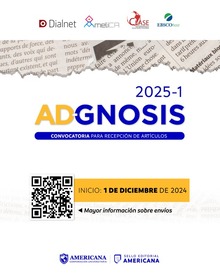Gobierno y Gerencia
DOI:
https://doi.org/10.21803/adgnosis.v5i5.205Palabras clave:
Política, Economía, Sistema, Empresa, DesigualdadResumen
En este artículo se abordan conceptos que intentan captar “el retorno de lo poli?tico” como determinante en las relaciones actuales entre poli?tica y economi?a. Ese “retorno” no se ha dado de una vez por todas sino que aflora en diversos campos y en diverssos momentos, muchas veces como contracorriente o como contrevidente. Pero ni todos esos campos ni todos esos momentos se intentan analizar aqui? sino simplemente una mi?nima parte que se deja ver en las relaciones de la poli?tica y la economi?a y particularmente cuande e?sta intenta convertirse en paradigma de la primera.
Palabras clave: Poli?tica, Economi?a, Sistema, Empresa, Desigualdad.
ABSTRACT
This article deals with concepts that try to capture “the come back of the political” as a determinant in the current relations between politics and economy. This “come back” has not occurred once and for all, but emerges in various fields and in different moments, often as a countercurrent or as a result of theoretical or political discussions. But not all those fields or all those moments are tried to analyze here but simply a minimal part that is seen in the relations of politics and economics and particularly when this tries to become a paradigm of the first.
Keywords: Politics, Economics, System, Firm, Inequality.
Descargas
Referencias
Acemoglu, D. & Robinson, J. A. (2001). A Theory of Political Transitions. En The American Economic Review, 91(4), 938- 963. Published by: American Economic Association Stable URL: http://www.jstor.org/stable/2677820
Ault, H. J. (2013). Some Reflections on the OECD and the Sources of International Tax Principles (July 1, 2013). Reprinted from Tax Notes International, 70(12), 1195. Working Paper of the Max Planck Institute for Tax Law and Public Finance No. 2013-03. Fuente: http://dx.doi. org/10.2139/ssrn.2287834
Comisión de la Unión Europea (2013). Recomendación de la Comisión, de 6 de diciembre del 2012, sobre la planificación fiscal agresiva, C(2012) 8806 final. Fuente: https://ec.europa.eu/taxation_ customs/sites/taxation/files/docs/bod- y/c_2012_8806_en.pdf
D’Andreis Zapata, A. (2013). Responsabilidad Social Empresarial RSE: un estudio desde sus teorías, precursores y críticos. AdGnosis, 2(2), 49-64.
Deutsch, K. W. (1969). Politische Kybernetik: Modelle und Perspektiven. Freiburg.
Downs, A. (1957). An Economic Theory of Democracy. New York.
Eston, D. (1965). A System Analisis of Political Life. Chicago.
Jaramillo, A. (2010). La Escuela Austriaca de Economía. Una nota introductoria. EAFIT. http://publicaciones.eafit.edu. co/index.php/ecos-economia/article/ view/180
Mouffe, C. (1993). The Return of the Political. London.
OECD (2014). Plan de acción contra la ero- sión de la base imponible y el traslado de beneficios. Fuente: http://dx.doi.org/10.1787/9789264207813-es
Parsons, T. (1937). The Structure of Social Action. New York.
Piketty, T. (2014). El Capital en el siglo XXI. Bogotá: FCE.
Rosales, J. M. (2014). On the Irrelevant Place of Parliamentarism in Democratic Theory. En Palonen, K. & Rosales, J. M. (2014), The Politics of Dissensus: Parliament in Debate (pp. 23-50). Fuente: https://ebookcentral.proquest.com






